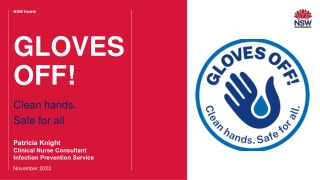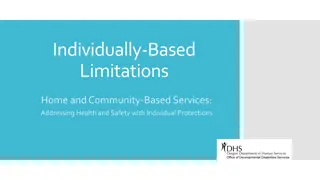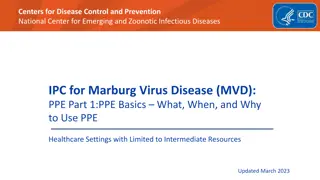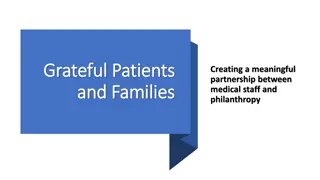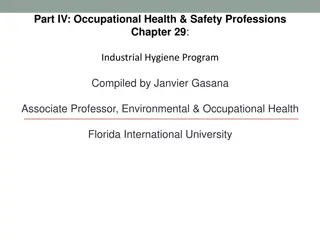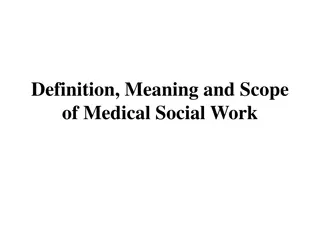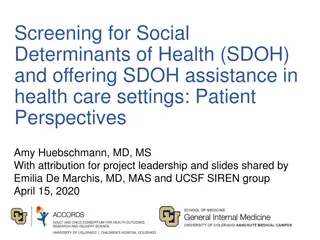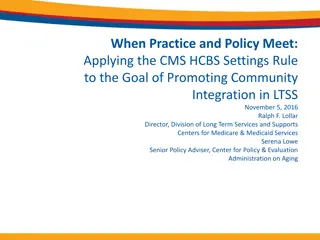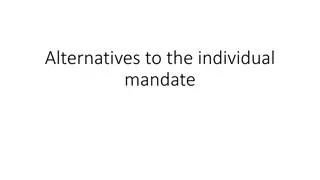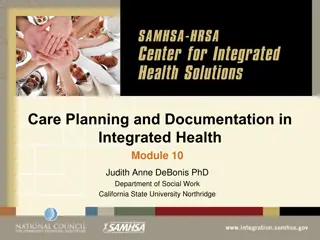Understanding Individual Healthcare Plans (IHP) in School Settings
Individual Healthcare Plans (IHPs) are crucial in schools to communicate and provide care for students with various health conditions. The history, importance, and criteria for implementing IHPs, including the types of students who require them, are detailed in this informative content.
Download Presentation

Please find below an Image/Link to download the presentation.
The content on the website is provided AS IS for your information and personal use only. It may not be sold, licensed, or shared on other websites without obtaining consent from the author. Download presentation by click this link. If you encounter any issues during the download, it is possible that the publisher has removed the file from their server.
E N D
Presentation Transcript
INDIVIDUAL HEALTHCARE PLANS Heartland IHP Project Missouri Family Partnership Family and Caregiver Retreat August 26, 2023
WHAT IS AN IHP? Individual Healthcare Plans are written plans used in the school setting to communicate a student s health condition and care/accommodations
HISTORY OF IHP PROJECT Many parents, school nurses, health care professionals, school administrators and advocates have recognized that a consistent/standardized practice is not in place for IHPs School nurse trainings
WHO WRITES AN IHP Development of the plan is the nurse s responsibility Based on standards of care regulated by the nurse practice acts Cannot be delegated to unlicensed individuals
Variety of emergent and non- emergent health conditions Not dependent on type of health condition WHICH STUDENTS REQUIRE AN IHP? Need for staff knowledge of the condition Need for intervention in the school setting
WHICH STUDENTS REQUIRE AN IHP? The student has a condition that requires scheduled daily medication, care/accommodations during the school day Healthcare plan needed (e.g., but not limited to: a student with ADHD medication at school, student with catheter care at school, student with tube feeding at school)
WHICH STUDENTS REQUIRE AN IHP? The student has a potentially life-threatening condition that requires as needed medication, care/accommodations Healthcare plan needed (e.g., but not limited to: student with medication for anaphylaxis allergy, student with medication at school for seizure disorder, student with medication at school for severe asthma)
WHICH STUDENTS REQUIRE AN IHP? The student has a condition that requires as needed medication, care/accommodations The need for a healthcare plan is made on an individual basis according to the need for care at school. (e.g., student with medication at school for migraines, student with medication for seasonal allergies. These students may not need a plan if these conditions are mild, do not happen frequently and/or no other accommodations are needed. Conversely, these students may have frequent needs related to these conditions and accommodations may be needed. In these cases, a healthcare plan would be needed.)
WHO IS INVOLVED IN DEVELOPING AN IHP? School nurse works with parent/guardian, student and physician to determine what care is required in the school setting School staff are also involved in the development of the plan
WHAT INFORMATION GOES IN THE IHP? Demographic information Health condition Nursing diagnosis Expected outcome Assessment/symptoms Plan (interventions and accommodations) Including goals to increase student independence Evaluation Any additional comments
WHO SHOULD UTILIZE THE PLAN? Any staff member who is responsible for knowing of the student s health condition and how to respond
IHPs are subject to state nursing practice laws ARE THERE LEGAL IMPLICATIONS? Often become part of IEP or 504 Would then be subject to applicable education or civil rights law
STUDENT/PARENT INPUT FORM When/how often is it a problem Type of condition How does it affect the child Medications Information from medical provider Family changes Related behaviors
PARENT MEETING School nurse meets with parent/guardian to gather medical documentation to learn about the student s specific condition and needs Individualize healthcare plan to the student IHP developed at the meeting with the parent, or after the meeting and then shared with the parent
REVIEW Review plans at least annually Review plans as any changes in health status occur It is preferable to review the plan prior to each new school year
WHAT CAN FAMILIES DO You can work with your child's health and school teams to make sure that all of his/her health needs are addressed in the school environment Since you know your child best, you are his/her best advocate
HOW TO BEGIN 1 2 3 Contact your child's school nurse or administration Coordinate with your child's healthcare provider Work with the school to set up an IHP planning meeting
SHARE HEALTH INFORMATION Talk with your child's healthcare provider about what health information is important to pass on to the school The school will need access to some health records
DURING THE IHP MEETING Make sure to discuss the roles of any necessary school staff Don't forget to consider staff like recess and lunch supervisors, specials teachers, coaches and even substitutes Make a plan for how to monitor the success of the IHP
PARENT AND STUDENT INPUT Remember that you and your child are valuable assets to the team Be sure to share your expertise during the meeting Don't be afraid to ask for any needed revisions
REQUEST A REVIEW Parents can request a review/revision of the IHP A review may be necessary when: There is a change in health status and/or treatment There is a change in family/home dynamics that may impact care needs at school The plan isn t working as written
OUTCOMES: SCHOOL NURSES Challenges Lessons learned The training was useful. Addressing transfer student s needs Provides consistency of care with shared responsibility Lack of parent involvement Teacher reluctance Increases independence Maximizes student s safety Process engaged parents
OUTCOMES: PARENTS The difference now is that the other staff are aware and alerted to [the student s] signs. It s not just on him to tell someone. It s important. I wish all kids could have this..all parents could have this. It s a relief. I worry about him still, but I worry a little less. Another parent who shared the IHP document with their doctor who was impressed at how thorough it is was. I feel better about him being at school. He can be a kid and play like the other kids. I know he is watched and safe, and they all know what to do if something happens. Yeah, before [my son] was on his IHP, he went to the ER at least once every school year. I never wanted to see the school s number on my phone. I was always nervous that he wasn t breathing, that something terrible happened again. We made it through the last two years with no trips to the ER, really no real severe incidents.
QUESTIONS? NEED ASSISTANCE OR ADDITIONAL INFORMATION? Emily Meier: Emily.a.meier@usd.edu Lori Williamson: lwdean@uams.edu
DISCLAIMER NO MEDICAL ADVICE. GENERAL INFORMATION PURPOSES ONLY. The information presented in these materials is being made available to you for educational purposes only. This material is not intended nor implied to represent the best or only methods or procedures appropriate for the particular situations discussed. The material, instead, is intended to present the views, opinions, or statements of the presenter, which may be helpful or of interest to other practitioners. The recommendations, provided here, are meant to provide suggested general guidance for school nurses in such nurses writing and implementing care plans. This guidance and the presenter s thoughts, ideas, opinions, or statements are not meant to replace nor supplant the independent medical judgment of any medical professional. Each medical professional shall be solely responsible for all medical judgment and decision making with respect to the provision of health care services to his or her students/patients. Thus, any attendee or user of these materials agrees to waive any claim they may have against the presenter for reliance on any information presented here. Users and/or attendees are advised to consult and follow the laws, regulations, and policies that are applicable to each user or attendee in such user or attendee s place of employment or medical practice.



